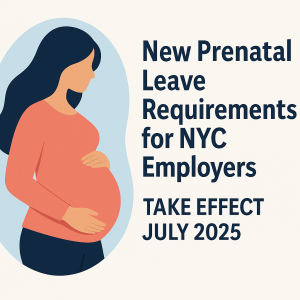In honor of Mental Health Awareness Month, the Wage and Hour Division of the U.S. Department of Labor (“US DOL”) has issued new guidance and answers to Frequently Asked Questions (“FAQs”) to help clarify when eligible employees of covered employers may use FMLA leave for their own or a family member’s mental health condition.
As a reminder, eligible employees may take FMLA leave if they cannot perform their essential job functions due to their own serious health condition, or to provide care for a spouse, child, or parent who is unable to work or perform other regular daily activities because of their serious health condition. A serious health condition can include a mental health condition.
Mental and physical health conditions are considered serious health conditions under the FMLA if they require inpatient care, such as an overnight stay in a treatment center for addiction, or continuing treatment by a healthcare provider, such as continuing treatment by a clinical psychologist.
In its guidance and FAQs, the US DOL provides specific examples of when eligible employees may use FMLA leave for medical health conditions. Those examples include leave by an employee who is unable to work because of severe anxiety, and leave by an employee to attend family counseling sessions for a spouse who is in an inpatient treatment program for substance abuse.
The US DOL also used their new guidance and FAQs to remind employers of their obligations under the FMLA that go beyond providing leave, such as their obligations to keep confidential employee medical records, including records regarding mental health conditions, and their obligations to protect from retaliation against any employee who takes FMLA leave or asserts rights under the FMLA.
If you have questions or concerns about the FMLA’s application to mental health conditions or the FMLA in general, please contact Chaim Book at cbook@mb-llp.com or Sheryl Galler at sgaller@mb-llp.com.

